| Listing 1 - 10 of 19 | << page >> |
Sort by
|
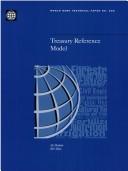
ISBN: 0821349457 9786610087631 1280087633 0585409293 Year: 2001 Publisher: Washington, D.C. : World Bank,
Abstract | Keywords | Export | Availability | Bookmark
 Loading...
Loading...Choose an application
- Reference Manager
- EndNote
- RefWorks (Direct export to RefWorks)
Public finance --- Information systems --- Finance, Public --- Data processing. --- Cameralistics --- Public finances --- Currency question

ISBN: 0821350307 9786610088508 1280088508 0585459096 Year: 2001 Publisher: Washington, D.C. : World Bank,
Abstract | Keywords | Export | Availability | Bookmark
 Loading...
Loading...Choose an application
- Reference Manager
- EndNote
- RefWorks (Direct export to RefWorks)
Economic growth --- Czechoslovakia --- Fiscal policy --- Budget deficits --- Finance, Public --- Cameralistics --- Public finance --- Public finances --- Currency question --- Deficits, Budget --- Budget --- Deficit financing --- Tax policy --- Taxation --- Economic policy --- Government policy
Book
ISBN: 1280087692 9786610087693 058545910X 0821350439 Year: 2001 Publisher: Washington, D.C. : World Bank,
Abstract | Keywords | Export | Availability | Bookmark
 Loading...
Loading...Choose an application
- Reference Manager
- EndNote
- RefWorks (Direct export to RefWorks)
Finance, Public --- Intergovernmental fiscal relations --- Federal-state fiscal relations --- Fiscal relations, Intergovernmental --- State-local fiscal relations --- Federal government --- Local finance --- Cameralistics --- Public finance --- Currency question --- Law and legislation --- Public finances
Dissertation
ISBN: 2247098584 Year: 2001 Publisher: Paris : Dalloz,
Abstract | Keywords | Export | Availability | Bookmark
 Loading...
Loading...Choose an application
- Reference Manager
- EndNote
- RefWorks (Direct export to RefWorks)
Finance, Public --- Administrative courts --- Examiners (Administrative procedure) --- Judicial review of administrative acts --- Administrative law judges --- Hearing examiners --- Trial examiners --- Administrative procedure --- Cameralistics --- Public finance --- Public finances --- Currency question --- Auditing --- Law and legislation --- Legal status, laws, etc. --- France.
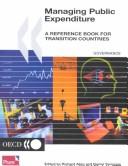
ISBN: 1280034882 9786610034888 9264192603 9264186530 Year: 2001 Publisher: Paris : OECD Publishing,
Abstract | Keywords | Export | Availability | Bookmark
 Loading...
Loading...Choose an application
- Reference Manager
- EndNote
- RefWorks (Direct export to RefWorks)
Managing Public Expenditure presents a comprehensive and in-depth analysis of all aspects of public expenditure management from the preparation of the budget to the execution, control and audit stages. The book will be of general interest but is focused particularly on the needs of countries in transition, especially those in Central and Eastern Europe that seek to become members of the European Union. The book provides practical, operational information and guidance on all areas of public expenditure management, e.g. legal and institutional frameworks, preparation of the budget, implementation, cash management, performance management, accounting, financial information and reporting systems, internal control and internal audit, and external audit. Each part of the book ends with key points and directions for reform. The detailed questionnaire will help practitioners to identify the strong and weak elements in their budget systems so that they can take necessary remedial action. Managing Public Expenditure ends with a comprehensive glossary, bibliography and index. Richard Allen is an economist and spent most of his career at HM Treasury (the British Ministry of Finance), working mainly in the areas of fiscal policy, EU affairs, public expenditure management and international finance. He has also served as a diplomat in Washington DC and as a board member of the European Investment Bank. He was head of the budget and resource allocation team of the SIGMA Programme and is now adviser on governance at the Asian Development Bank. Daniel Tommasi is a Paris-based consultant in the the areas of fiscal policy, public expenditure management and macroeconomic management. He is an adviser to governments and a consultant for international organisations, including the World Bank, the Asian Development Bank, the United Nations Development Programme, and the European Union's Phare and Tacis Programmes. He has worked for over 25 years in some 30 countries in Central and Eastern Europe, the Middle East, Asia, the Pacific and Africa.
Budget -- Europe, Central. --- Budget. --- Expenditures, Public -- Europe, Central. --- Expenditures, Public. --- Finance, Public -- Europe, Central. --- Finance, Public. --- Expenditures, Public --- Finance, Public --- Budget --- Political Science --- Law, Politics & Government --- Public Finance --- Budgeting --- Cameralistics --- Public finance --- Appropriations and expenditures --- Government appropriations --- Government expenditures --- Government spending --- Public expenditures --- Public spending --- Spending, Government --- Currency question --- Public administration --- Government spending policy --- Forecasting --- Public finances --- Dépenses publiques --- Finances publiques
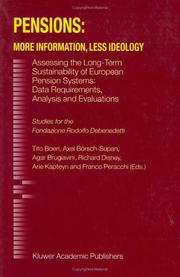

ISBN: 0792375319 144194916X 1475733631 Year: 2001 Publisher: Boston : Kluwer Academic Pubilshers,
Abstract | Keywords | Export | Availability | Bookmark
 Loading...
Loading...Choose an application
- Reference Manager
- EndNote
- RefWorks (Direct export to RefWorks)
Europeans are living longer, and fewer now remain in the labour force as they grow older. Many European countries have responded to the ensuing financial pressure by reforming their public pension systems and health care programmes. There is considerable uncertainty as to the effects of these reforms - as they typically do not alter the unfunded nature of public welfare arrangements and this uncertainty is itself costly. Not only does it undermine the credibility of public welfare programmes, but it may also distort labour supply behaviour, decisions regarding savings and capital accumulation. More generally there is uncertainty about the overall impact of ageing on welfare and society and the multiple domains in which its effects may develop. Pensions: More Information, Less Ideology builds on the existing evidence - mostly in the field of public pensions - and highlights the advantages that would be obtained by: harmonising methodologies used in the various countries to report pension outlays and forecast future pension liabilities or more generally public spending; defining common standards as to the frequency of expenditure forecasts and the length of the forecast horizons for welfare expenditures; developing European longitudinal survey of persons pre- and post retirement age, providing timely information on a wide array of decisions by individuals and household related to the ageing process and the ongoing trends.
Old age pensions --- Retirement income --- Older people --- Pensions de vieillesse --- Personnes âgées --- Economic conditions --- Conditions économiques --- Personnes âgées --- Conditions économiques --- Economic conditions. --- Public finance. --- Labor economics. --- Microeconomics. --- Public Economics. --- Labor Economics. --- Price theory --- Economics --- Cameralistics --- Public finance --- Public finances --- Currency question
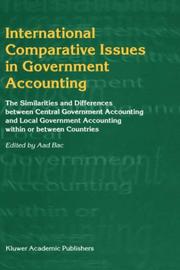
ISBN: 1441948813 9781441948816 0792372972 1475755635 Year: 2001 Publisher: Boston Kluwer
Abstract | Keywords | Export | Availability | Bookmark
 Loading...
Loading...Choose an application
- Reference Manager
- EndNote
- RefWorks (Direct export to RefWorks)
Due to the developments in the role of governments, the importance of government accounting and financial reporting is increasing. This led to changes in Government Accounting all over the world. For institutional, public finance and other reasons this has not always been done for central governments and regional and local governments in the same way. Some countries maintain the cash basis, some changed over to the accrual basis. Many of them started at first with lower government levels, only few changed over completely. Comparative Issues in Government and Accounting aims to give insight in the array of different patterns the world shows with respect to government accounting and financial reporting. Of course a complete overview would have been too ambitious a goal. This book brings together an interesting number of academics coming from a representative number of countries to get an impression of the situation and especially of the existence and the backgrounds of similarities and differences. Thirty-five authors and co-authors produced 21 chapters reflecting on the situations in 16 countries on 4 continents. Countries dealt with are Albania, Australia, Belgium, China, Egypt, Finland, France, Japan, The Netherlands, New Zealand, Norway, Poland, Russia, Spain, the United Kingdom and the United States.
Finance, Public --- Local finance --- Accounting. --- #SBIB:012.IO --- #SBIB:35H220 --- County finance --- Finance, Local --- Township finance --- Grants-in-aid --- Cameralistics --- Public finance --- Public finances --- Currency question --- Accounting --- Financieel management bij de overheid: algemene werken --- Bookkeeping . --- Public finance. --- Accounting/Auditing. --- Public Economics. --- Double entry bookkeeping --- Business --- Business education --- Accountancy --- Business enterprises --- Commerce --- Commercial accounting --- Finance --- Financial accounting --- Bookkeeping

ISBN: 2728306052 9782728306053 Year: 2001 Volume: 278 Publisher: Rome Ecole française de Rome
Abstract | Keywords | Export | Availability | Bookmark
 Loading...
Loading...Choose an application
- Reference Manager
- EndNote
- RefWorks (Direct export to RefWorks)
Taxation --- Customs administration --- Impôt --- Douanes --- Rome --- Provinces --- Administration --- Finance, Public --- Roman provinces --- History. --- Rome (Italie) --- -Taxation --- -Duties --- Fee system (Taxation) --- Tax policy --- Tax reform --- Taxation, Incidence of --- Taxes --- Revenue --- Cameralistics --- Public finance --- Currency question --- History --- Gaul --- -Germany --- Gallia --- Gaule --- -History --- -Provinces --- -History. --- Impôt --- Germany --- Duties --- Provinces of Rome --- Administration. --- Public finances --- Taxation - Rome - History. --- Finance, Public - Rome - History. --- Roman provinces - Gaul - History. --- Roman provinces - Germany - History.
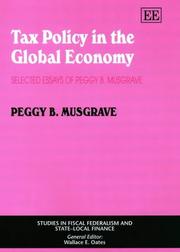
ISBN: 1840643137 9781840643138 Year: 2001 Publisher: Northampton Edward Elgar Publishing
Abstract | Keywords | Export | Availability | Bookmark
 Loading...
Loading...Choose an application
- Reference Manager
- EndNote
- RefWorks (Direct export to RefWorks)
globalisation --- economie --- politique fiscale --- systemes fiscaux --- international --- globalisering --- fiscaal beleid --- belastingstelsels --- internationaal --- -Public finance --- Taxation --- Investments, Foreign --- Finance, Public --- #SBIB:023.IO --- #SBIB:33H13 --- #SBIB:35H435 --- 334.4 --- 336.200 --- AA / International- internationaal --- Duties --- Fee system (Taxation) --- Tax policy --- Tax reform --- Taxation, Incidence of --- Taxes --- Revenue --- Taxation of foreign investments --- Income tax --- Cameralistics --- Public finance --- Currency question --- Economische politiek --- Beleidssectoren: economisch en werkgelegenheidsbeleid --- Openbare financiën. Samenwerking op fiscaal gebied --- Belastingstelsel: algemene naslagwerken en principes --- Foreign income --- Public finances --- Investments, Foreign - Taxation

ISBN: 9681209893 6076286148 Year: 2001 Publisher: México, D.F. Colegio de México
Abstract | Keywords | Export | Availability | Bookmark
 Loading...
Loading...Choose an application
- Reference Manager
- EndNote
- RefWorks (Direct export to RefWorks)
En México el tránsito del antiguo régimen colonial a la sociedad postindependiente estuvo marcado por fuertes rupturas pero también por importantes continuidades. Especialmente compleja fue la transformación de las estructuras fiscales y de los numerosos impuestos que habían sido el sostén financiero del gobierno virreinal de la Nueva España durante tres siglos. Las reformas introducidas con la independencia mexicana modificaron de manera fundamental a la vieja maquinaria y normativa fiscal, pero también retuvieron algunas contribuciones ya seculares. Los textos aquí reunidos se articulan en torno a una misma problemática: la transición del sistema fiscal colonial impuesto desde la metrópoli a la redefinición y recreación de uno propio, en constante negociación junto a los proyectos en pugna por construir una nación independiente.
History of Mexico --- anno 1700-1799 --- anno 1800-1899 --- Politics and government. --- Finance, Public. --- BUSINESS & ECONOMICS / Public Finance. --- Finance, Public --- History --- Colonies --- Mexico. --- Mexique --- Mexico --- Politique et gouvernement --- Politics and government --- Cameralistics --- Public finance --- Public finances --- Currency question --- Anáhuac --- Estados Unidos Mexicanos --- Maxico --- Méjico --- Mekishiko --- Meḳsiḳe --- Meksiko --- Meksyk --- Messico --- Mexique (Country) --- República Mexicana --- Stany Zjednoczone Meksyku --- United Mexican States --- United States of Mexico --- מקסיקו --- メキシコ --- Public finance & taxation
| Listing 1 - 10 of 19 | << page >> |
Sort by
|

 Search
Search Feedback
Feedback About UniCat
About UniCat  Help
Help News
News